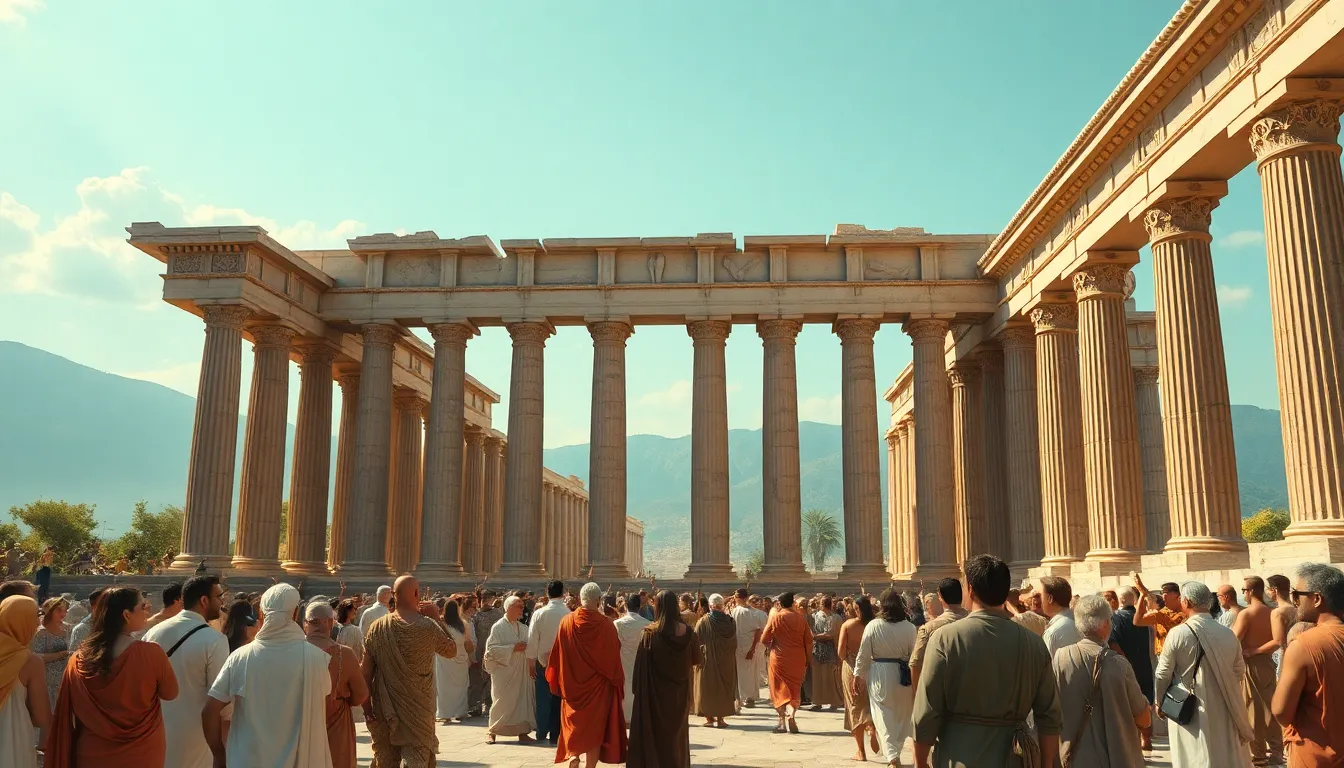The Origins of the Panhellenic Festivals: Unity Through Celebration
I. Introduction
In ancient Greece, the term “Panhellenic Festivals” refers to a series of athletic and religious competitions that were celebrated by all Greek city-states. These festivals served not only as a showcase of athletic prowess but also as a means of fostering unity among the diverse populations of Greece. The significance of these festivals lay in their ability to bring together individuals from different city-states, facilitating a shared cultural identity and promoting peace amidst a backdrop of political rivalry.
This article will delve into the origins and significance of the Panhellenic festivals, exploring their historical context, key events, and lasting impact on both ancient and modern civilizations.
II. Historical Context of Ancient Greece
The political landscape of ancient Greece was characterized by a multitude of independent city-states, or poleis, each with its own governance, customs, and culture. This fragmentation often led to conflict and rivalry among the various city-states, making it crucial to establish a common ground that could promote unity.
Cultural diversity was a hallmark of ancient Greek life, with each city-state holding unique traditions, dialects, and religious practices. The need for shared identity became increasingly apparent as these city-states sought to navigate their differences and find common interests. It was within this context that the Panhellenic festivals emerged as a solution to bridge the gaps between the diverse Greek communities.
III. The Emergence of the Panhellenic Festivals
Initially, festivals in ancient Greece were predominantly local events, celebrated within individual city-states. However, as the idea of a collective Greek identity began to take shape, larger festivals that encompassed multiple city-states started to emerge.
The role of religion and mythology was central to the formation of these festivals. The Greeks believed that their gods played an active role in their lives, and many of the Panhellenic festivals were dedicated to specific deities. For instance:
- The Olympic Games honored Zeus.
- The Pythian Games celebrated Apollo.
- The Nemean Games were dedicated to Zeus and Hercules.
Key figures in the establishment of these events included both legendary heroes and influential leaders who recognized the importance of fostering unity among the Greek people through shared celebrations.
IV. Major Panhellenic Festivals
Among the most celebrated Panhellenic festivals were the Olympic Games, the Pythian Games, and the Nemean and Isthmian Games. Each of these events held significant cultural and religious importance.
A. The Olympic Games: Origins and Evolution
The Olympic Games, held in Olympia, are perhaps the most famous of the Panhellenic festivals. They began in 776 BC and were originally a religious festival honoring Zeus. Over time, the games evolved into a major athletic competition that attracted participants and spectators from across the Greek world.
B. The Pythian Games: Celebrating Apollo
Established in 582 BC, the Pythian Games took place in Delphi and were held in honor of Apollo. In addition to athletic competitions, the festival featured musical contests and dramatic performances, showcasing the rich cultural expressions of the time.
C. The Nemean and Isthmian Games: Their Contributions to Panhellenism
The Nemean Games, held in Nemea, and the Isthmian Games, celebrated near Corinth, were also crucial in promoting Panhellenic ideals. These events included various athletic contests and provided a platform for athletes to gain fame and recognition beyond their local communities.
V. The Role of Competition and Athletics
Athletic contests were more than just displays of physical strength; they served as a unifying force for the Greek people. Victors of these games were celebrated as heroes and often brought honor to their respective city-states.
The significance of victors extended beyond personal glory. Winning athletes were seen as representatives of their communities, reinforcing the bond between individuals and their homeland. This connection played a vital role in shaping Greek identity, as citizens rallied around their champions during the festivals.
VI. Cultural and Artistic Expressions
Panhellenic festivals were not solely about athletics; they also functioned as platforms for artistic and cultural expression. The events provided opportunities for:
- Performances of theater and dramatic arts.
- Musical competitions that showcased the talents of musicians and poets.
- Exhibitions of visual arts, including sculptures and paintings.
The artistic contributions made during these festivals left a lasting legacy, influencing the development of Greek culture and continuing to inspire future generations.
VII. The Festivals’ Influence on Later Civilizations
The Panhellenic festivals did not vanish with the decline of ancient Greece; rather, they adapted and transformed in subsequent civilizations. In Roman times, the Olympic Games were incorporated into Roman culture, evolving into spectacles that entertained the masses.
Moreover, the ideals of Panhellenism influenced the development of modern festivals. Today, many sporting events and cultural celebrations echo the spirit of unity and competition that characterized the ancient festivals. Examples include:
- The modern Olympic Games, which revive the ancient tradition of athletic competition.
- Cultural festivals that celebrate shared heritage and community.
This continuity of traditions underscores the enduring impact of the Panhellenic festivals on contemporary society.
VIII. Conclusion
In summary, the Panhellenic festivals were a vital aspect of ancient Greek culture, serving as a catalyst for unity and shared identity among diverse city-states. These celebrations fostered a sense of community, transcended political rivalries, and provided a platform for artistic expression.
Reflecting on the legacy of these festivals reveals the importance of cultural heritage in modern society. The ideals of unity through celebration continue to resonate today, reminding us of the power of cultural events to bring people together across differences.
The Panhellenic festivals stand as a testament to the human spirit’s capacity for connection, competition, and creativity, inspiring future generations to celebrate their shared identities.




